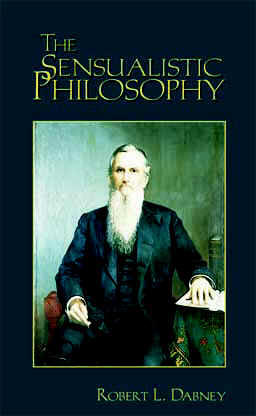** The Sensualistic Philosophy of the Nineteenth Century Considered by Robert Lewis Dabney. Naphtali Press is out of copies; see Solid Ground Christian Books for any remaining copies. Printed case. Hard bound book. Color portrait of the author on the cover (oil on canvas in possession of the University of Texas at Austin). 6×9. 304 pp. Retail $30.00. See Store for Sale Pricing. Never before reprinted since the 19th century. A newly typeset edition edited from the first and second editions with some critical and many bibliographical notes. Of most interest will be Dabney’s treatment of Evolution. Preface by Prof. C. N. Willborn (Greenville Presbyterian Theological Seminary).Considered by Dabney as one of His most Significant BooksSome Chapter Headings: The Sensualistic Philosophy of the Nineteenth Century Considered by Robert Lewis Dabney. Naphtali Press is out of copies; see Solid Ground Christian Books for any remaining copies. Printed case. Hard bound book. Color portrait of the author on the cover (oil on canvas in possession of the University of Texas at Austin). 6×9. 304 pp. Retail $30.00. See Store for Sale Pricing. Never before reprinted since the 19th century. A newly typeset edition edited from the first and second editions with some critical and many bibliographical notes. Of most interest will be Dabney’s treatment of Evolution. Preface by Prof. C. N. Willborn (Greenville Presbyterian Theological Seminary).Considered by Dabney as one of His most Significant BooksSome Chapter Headings: Positivism, Evolution Theory, Physiological Materialism, Spirituality Of The Mind, Evolution Theory Materialistic, And Therefore False, Validity Of À-Priori Notions, Origin Of À-Priori Notions, Refutation Of Sensualistic Ethics, Philosophy And The Supernatural, The Evolution Of Human Souls.Robert Lewis Dabney was perhaps the greatest of the 19th century Southern Presbyterian theologians. “He wrote ably on theology, politics, government, education, culture, and history.” Yet he considered two of his books on philosophy to be in his own opinion his most worthwhile contributions. Next to The Practical Philosophy, Dabney considered The Sensualistic Philosophy of the Nineteenth Century Considered (1875 and 1887) as his ablest work. He was, not unlike a number of very able eighteenth and nineteenth century theologians, a practitioner of Scottish Common Sense Realism. Yet, he has recently been described as an eclectic in his utilization of the Common Sense Philosophy. Certainly he was no slave to a philosophical system that was in his day in substantial flux. Still it is accurate for categorization to label him a Common Sense Realist. As a Scottish Realist he held tenaciously to “that class of truths known as primary cognitions, innate ideas, [and] first truths.” Dabney held these “first truths,” to be “faith assumptions,” to borrow from Dr. Douglas Kelly. As such, the “first truths” influenced and shaped human reasoning. Furthermore, Kelly likened Dabney to Cornelius Van Til in the way he consistently showed how non-theists “reasoned on the basis of unproven, faith assumptions.” In relation to the more famous Scottish names associated with Common Sense, Dabney followed Thomas Reid most closely. With his greatest energies Dabney plied his philosophical skills in reducing to absurdity the sensational philosophies of Berkeley, Condillac, Hobbes, Locke, James Mill, J.S. Mill, and Spencer. Evidence of his eclecticism and objectivity is seen in his many correctives offered to fellow Scottish Realist, Sir William Hamilton. Dabney’s criticisms of his fellow Realists and refinements to the philosophical system he utilized so fully make him an interesting and profitable study for contemporary philosophers and apologists. This would be particularly true of those apologists who share Dabney’s commitment to Reformed or Calvinistic theology. Dabney is proof that regardless of our nuanced differences in apologetics, we can learn much from the older theology and philosophy. In the end, it may be that the greatest value in reprinting Dabney’s “philosophic philippic” will be found in his evaluation of the evolution theory and its logical fallacies. From the preface by C. N. Willborn. **Solid Ground Christian Books has purchased all the remaining inventory of this title. See http://www.solid-ground-books.com/ |
